Organisational Behaviour in Tesco: A Detailed Analysis Report
VerifiedAdded on 2023/06/18
|14
|4986
|346
Report
AI Summary
This report provides an analysis of organisational behaviour within Tesco, examining the influence of organisational culture, politics, and power on individual and team behaviour and performance. It evaluates content and process theories of motivation, including Maslow's hierarchy of needs and Vroom's expectancy theory, and motivational techniques used to achieve organisational goals. The report also explains the characteristics of effective and ineffective teams, applying Tuckman's stages of group development. Furthermore, it applies concepts and philosophies of organisational behaviour within the Tesco context, considering leadership styles and their impact on employee motivation and overall business performance. The report concludes with recommendations for improving organisational effectiveness within Tesco. Desklib offers a range of similar solved assignments and study resources for students.
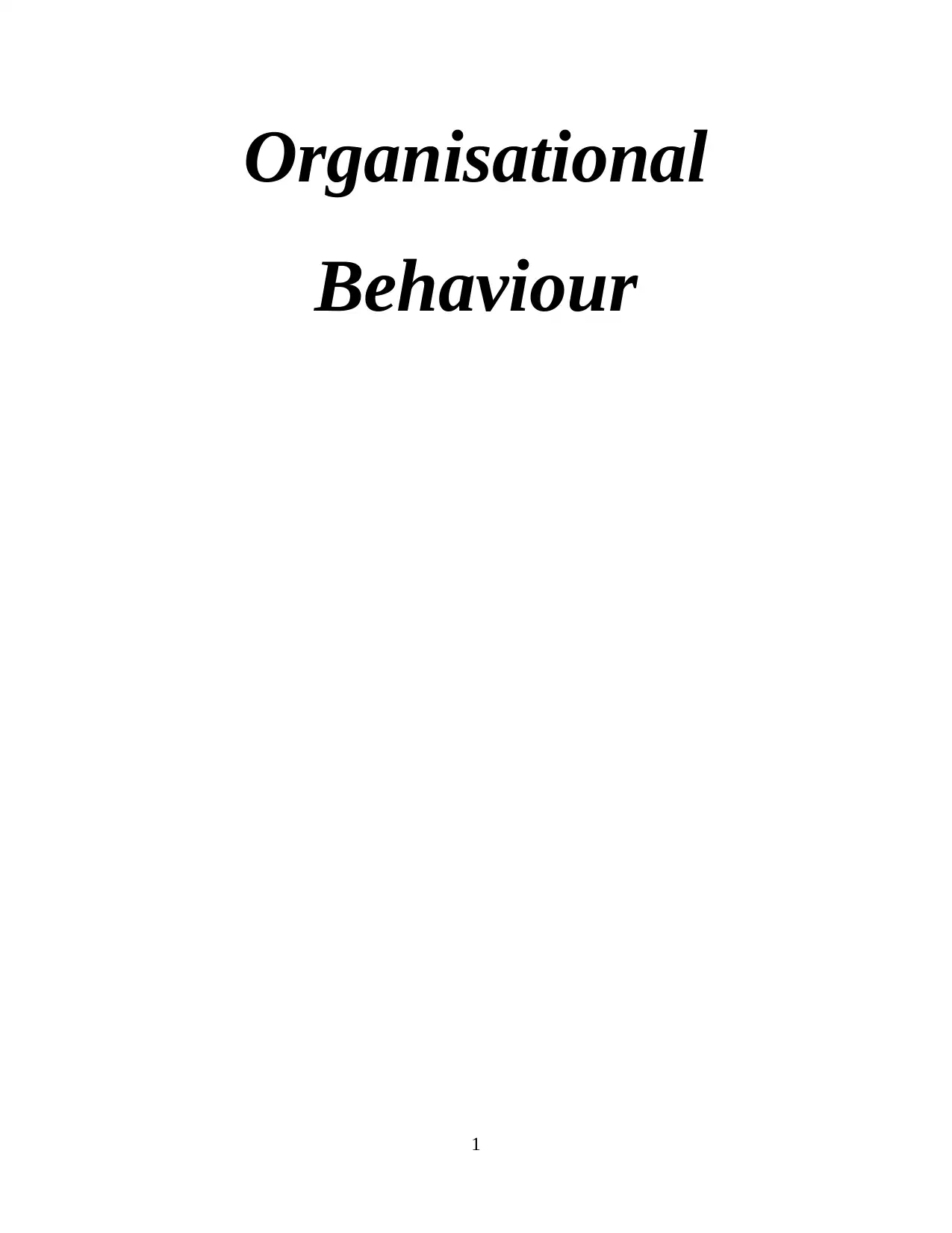
Organisational
Behaviour
1
Behaviour
1
Paraphrase This Document
Need a fresh take? Get an instant paraphrase of this document with our AI Paraphraser
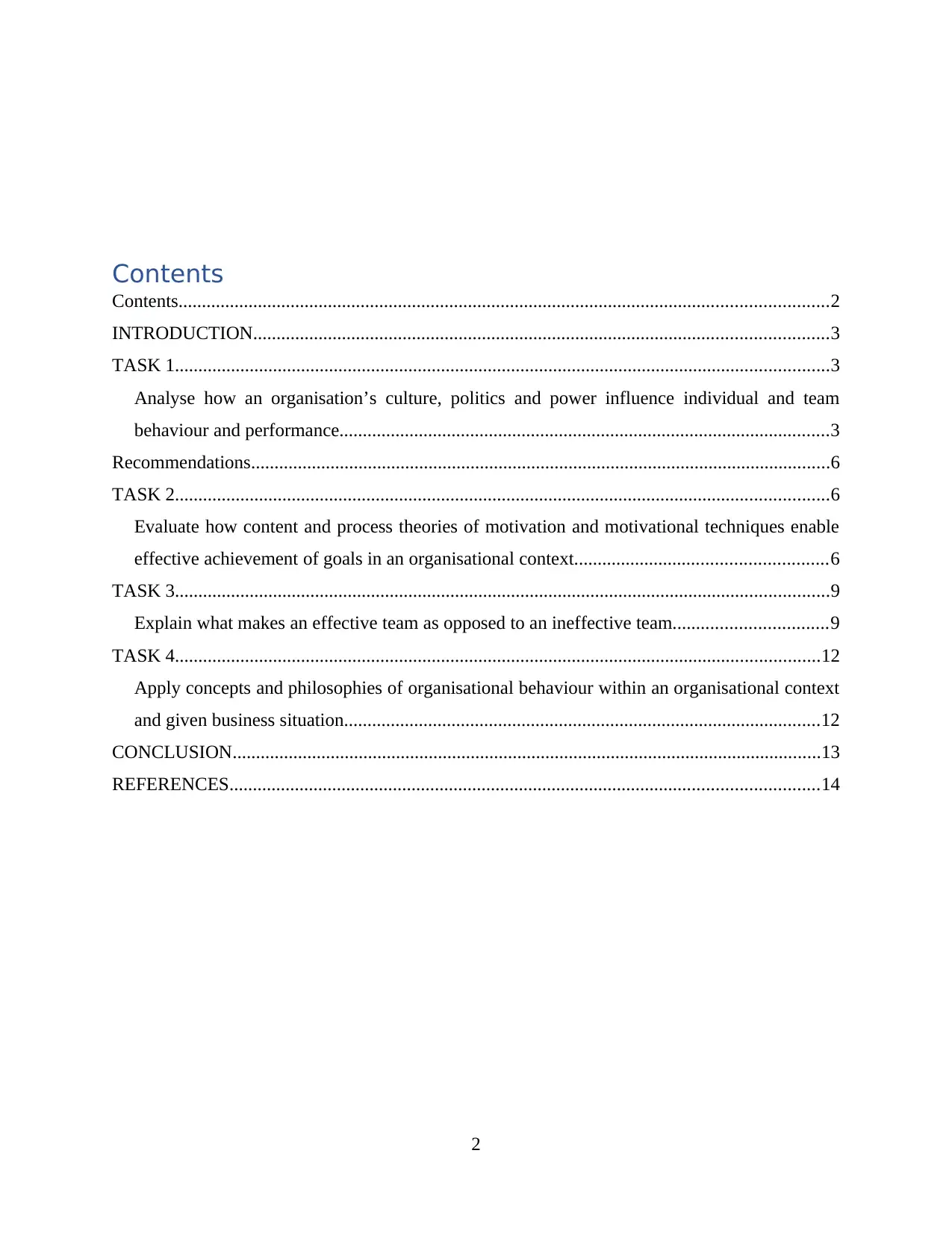
Contents
Contents...........................................................................................................................................2
INTRODUCTION...........................................................................................................................3
TASK 1............................................................................................................................................3
Analyse how an organisation’s culture, politics and power influence individual and team
behaviour and performance.........................................................................................................3
Recommendations............................................................................................................................6
TASK 2............................................................................................................................................6
Evaluate how content and process theories of motivation and motivational techniques enable
effective achievement of goals in an organisational context......................................................6
TASK 3............................................................................................................................................9
Explain what makes an effective team as opposed to an ineffective team.................................9
TASK 4..........................................................................................................................................12
Apply concepts and philosophies of organisational behaviour within an organisational context
and given business situation......................................................................................................12
CONCLUSION..............................................................................................................................13
REFERENCES..............................................................................................................................14
2
Contents...........................................................................................................................................2
INTRODUCTION...........................................................................................................................3
TASK 1............................................................................................................................................3
Analyse how an organisation’s culture, politics and power influence individual and team
behaviour and performance.........................................................................................................3
Recommendations............................................................................................................................6
TASK 2............................................................................................................................................6
Evaluate how content and process theories of motivation and motivational techniques enable
effective achievement of goals in an organisational context......................................................6
TASK 3............................................................................................................................................9
Explain what makes an effective team as opposed to an ineffective team.................................9
TASK 4..........................................................................................................................................12
Apply concepts and philosophies of organisational behaviour within an organisational context
and given business situation......................................................................................................12
CONCLUSION..............................................................................................................................13
REFERENCES..............................................................................................................................14
2
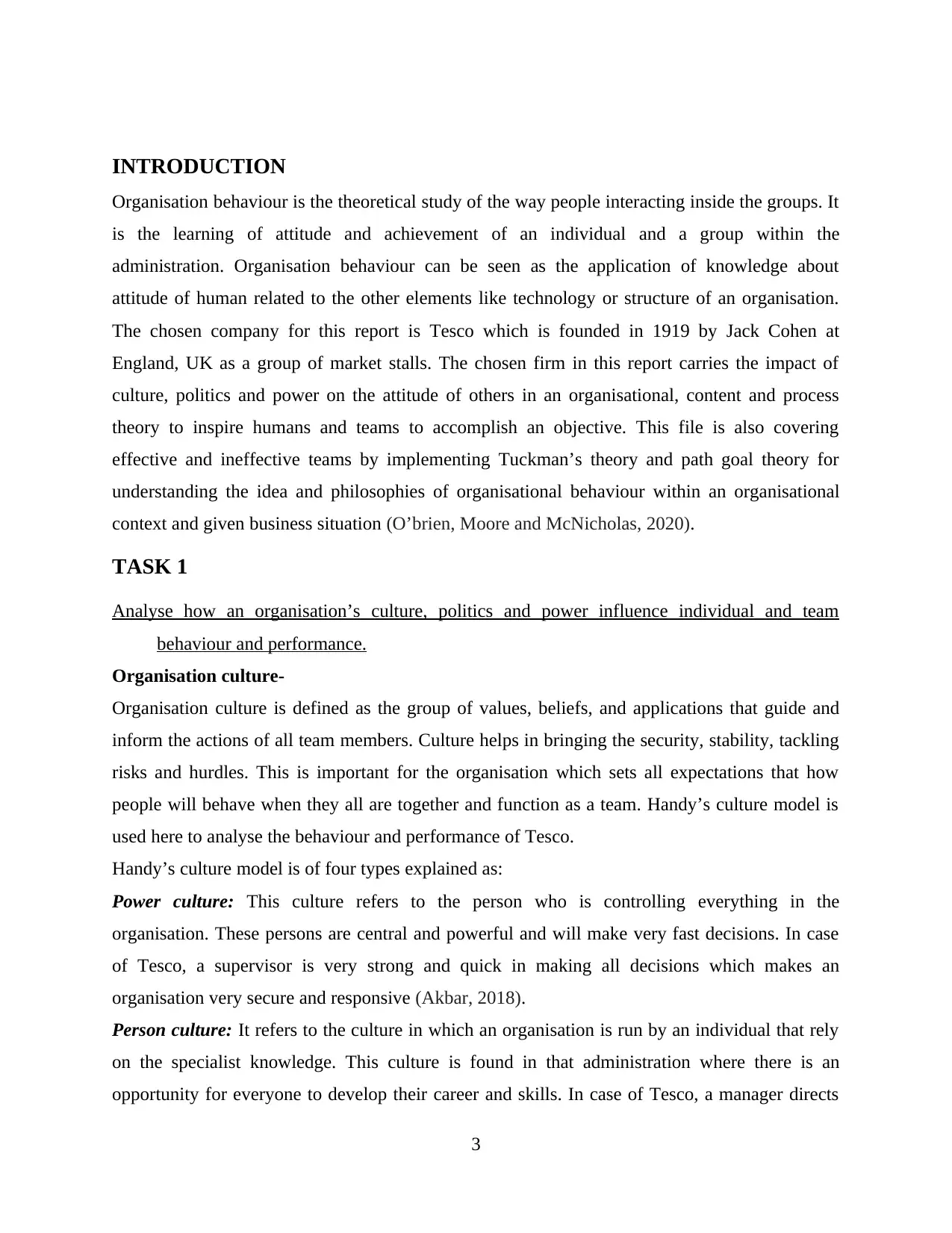
INTRODUCTION
Organisation behaviour is the theoretical study of the way people interacting inside the groups. It
is the learning of attitude and achievement of an individual and a group within the
administration. Organisation behaviour can be seen as the application of knowledge about
attitude of human related to the other elements like technology or structure of an organisation.
The chosen company for this report is Tesco which is founded in 1919 by Jack Cohen at
England, UK as a group of market stalls. The chosen firm in this report carries the impact of
culture, politics and power on the attitude of others in an organisational, content and process
theory to inspire humans and teams to accomplish an objective. This file is also covering
effective and ineffective teams by implementing Tuckman’s theory and path goal theory for
understanding the idea and philosophies of organisational behaviour within an organisational
context and given business situation (O’brien, Moore and McNicholas, 2020).
TASK 1
Analyse how an organisation’s culture, politics and power influence individual and team
behaviour and performance.
Organisation culture-
Organisation culture is defined as the group of values, beliefs, and applications that guide and
inform the actions of all team members. Culture helps in bringing the security, stability, tackling
risks and hurdles. This is important for the organisation which sets all expectations that how
people will behave when they all are together and function as a team. Handy’s culture model is
used here to analyse the behaviour and performance of Tesco.
Handy’s culture model is of four types explained as:
Power culture: This culture refers to the person who is controlling everything in the
organisation. These persons are central and powerful and will make very fast decisions. In case
of Tesco, a supervisor is very strong and quick in making all decisions which makes an
organisation very secure and responsive (Akbar, 2018).
Person culture: It refers to the culture in which an organisation is run by an individual that rely
on the specialist knowledge. This culture is found in that administration where there is an
opportunity for everyone to develop their career and skills. In case of Tesco, a manager directs
3
Organisation behaviour is the theoretical study of the way people interacting inside the groups. It
is the learning of attitude and achievement of an individual and a group within the
administration. Organisation behaviour can be seen as the application of knowledge about
attitude of human related to the other elements like technology or structure of an organisation.
The chosen company for this report is Tesco which is founded in 1919 by Jack Cohen at
England, UK as a group of market stalls. The chosen firm in this report carries the impact of
culture, politics and power on the attitude of others in an organisational, content and process
theory to inspire humans and teams to accomplish an objective. This file is also covering
effective and ineffective teams by implementing Tuckman’s theory and path goal theory for
understanding the idea and philosophies of organisational behaviour within an organisational
context and given business situation (O’brien, Moore and McNicholas, 2020).
TASK 1
Analyse how an organisation’s culture, politics and power influence individual and team
behaviour and performance.
Organisation culture-
Organisation culture is defined as the group of values, beliefs, and applications that guide and
inform the actions of all team members. Culture helps in bringing the security, stability, tackling
risks and hurdles. This is important for the organisation which sets all expectations that how
people will behave when they all are together and function as a team. Handy’s culture model is
used here to analyse the behaviour and performance of Tesco.
Handy’s culture model is of four types explained as:
Power culture: This culture refers to the person who is controlling everything in the
organisation. These persons are central and powerful and will make very fast decisions. In case
of Tesco, a supervisor is very strong and quick in making all decisions which makes an
organisation very secure and responsive (Akbar, 2018).
Person culture: It refers to the culture in which an organisation is run by an individual that rely
on the specialist knowledge. This culture is found in that administration where there is an
opportunity for everyone to develop their career and skills. In case of Tesco, a manager directs
3
⊘ This is a preview!⊘
Do you want full access?
Subscribe today to unlock all pages.

Trusted by 1+ million students worldwide
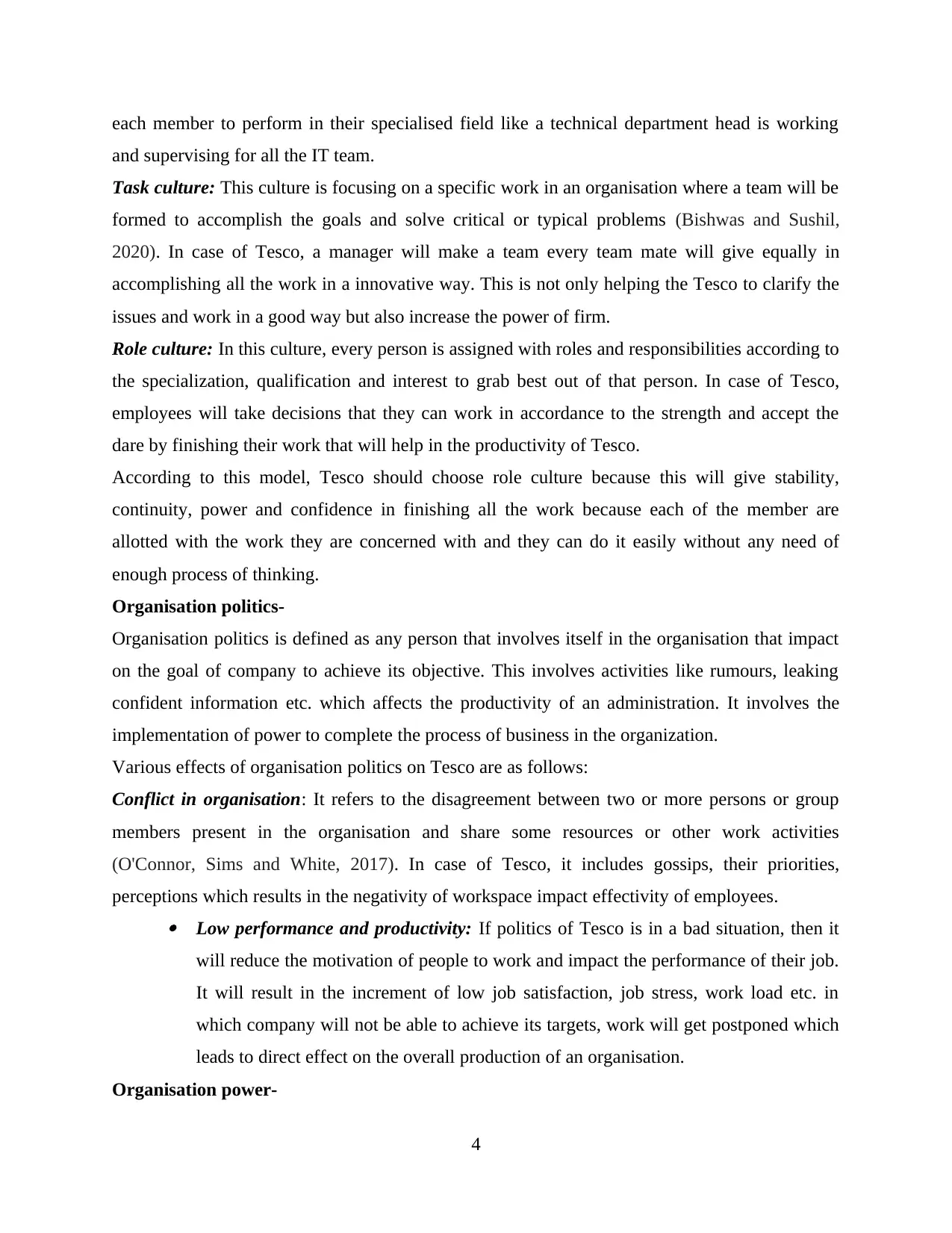
each member to perform in their specialised field like a technical department head is working
and supervising for all the IT team.
Task culture: This culture is focusing on a specific work in an organisation where a team will be
formed to accomplish the goals and solve critical or typical problems (Bishwas and Sushil,
2020). In case of Tesco, a manager will make a team every team mate will give equally in
accomplishing all the work in a innovative way. This is not only helping the Tesco to clarify the
issues and work in a good way but also increase the power of firm.
Role culture: In this culture, every person is assigned with roles and responsibilities according to
the specialization, qualification and interest to grab best out of that person. In case of Tesco,
employees will take decisions that they can work in accordance to the strength and accept the
dare by finishing their work that will help in the productivity of Tesco.
According to this model, Tesco should choose role culture because this will give stability,
continuity, power and confidence in finishing all the work because each of the member are
allotted with the work they are concerned with and they can do it easily without any need of
enough process of thinking.
Organisation politics-
Organisation politics is defined as any person that involves itself in the organisation that impact
on the goal of company to achieve its objective. This involves activities like rumours, leaking
confident information etc. which affects the productivity of an administration. It involves the
implementation of power to complete the process of business in the organization.
Various effects of organisation politics on Tesco are as follows:
Conflict in organisation: It refers to the disagreement between two or more persons or group
members present in the organisation and share some resources or other work activities
(O'Connor, Sims and White, 2017). In case of Tesco, it includes gossips, their priorities,
perceptions which results in the negativity of workspace impact effectivity of employees.
Low performance and productivity: If politics of Tesco is in a bad situation, then it
will reduce the motivation of people to work and impact the performance of their job.
It will result in the increment of low job satisfaction, job stress, work load etc. in
which company will not be able to achieve its targets, work will get postponed which
leads to direct effect on the overall production of an organisation.
Organisation power-
4
and supervising for all the IT team.
Task culture: This culture is focusing on a specific work in an organisation where a team will be
formed to accomplish the goals and solve critical or typical problems (Bishwas and Sushil,
2020). In case of Tesco, a manager will make a team every team mate will give equally in
accomplishing all the work in a innovative way. This is not only helping the Tesco to clarify the
issues and work in a good way but also increase the power of firm.
Role culture: In this culture, every person is assigned with roles and responsibilities according to
the specialization, qualification and interest to grab best out of that person. In case of Tesco,
employees will take decisions that they can work in accordance to the strength and accept the
dare by finishing their work that will help in the productivity of Tesco.
According to this model, Tesco should choose role culture because this will give stability,
continuity, power and confidence in finishing all the work because each of the member are
allotted with the work they are concerned with and they can do it easily without any need of
enough process of thinking.
Organisation politics-
Organisation politics is defined as any person that involves itself in the organisation that impact
on the goal of company to achieve its objective. This involves activities like rumours, leaking
confident information etc. which affects the productivity of an administration. It involves the
implementation of power to complete the process of business in the organization.
Various effects of organisation politics on Tesco are as follows:
Conflict in organisation: It refers to the disagreement between two or more persons or group
members present in the organisation and share some resources or other work activities
(O'Connor, Sims and White, 2017). In case of Tesco, it includes gossips, their priorities,
perceptions which results in the negativity of workspace impact effectivity of employees.
Low performance and productivity: If politics of Tesco is in a bad situation, then it
will reduce the motivation of people to work and impact the performance of their job.
It will result in the increment of low job satisfaction, job stress, work load etc. in
which company will not be able to achieve its targets, work will get postponed which
leads to direct effect on the overall production of an organisation.
Organisation power-
4
Paraphrase This Document
Need a fresh take? Get an instant paraphrase of this document with our AI Paraphraser
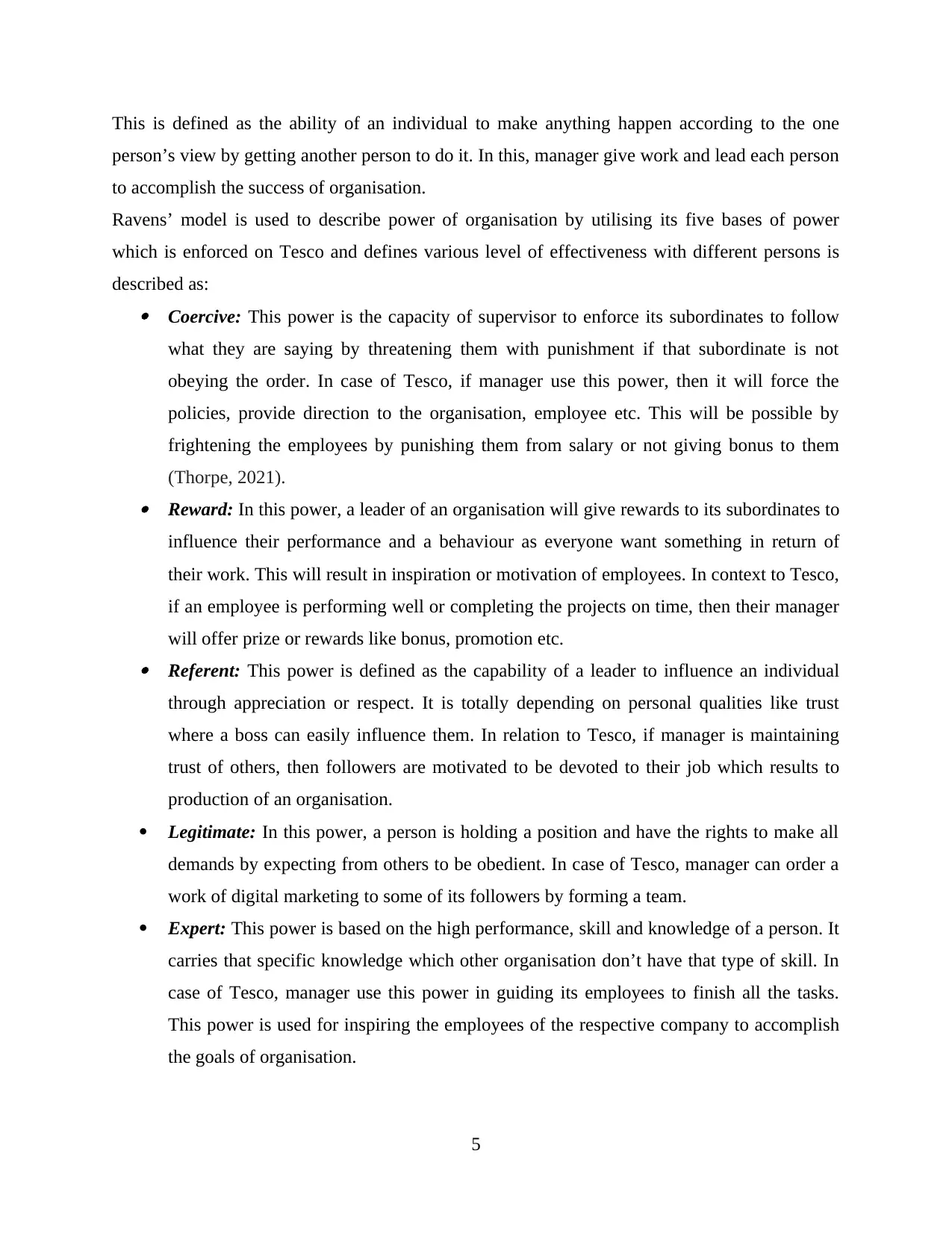
This is defined as the ability of an individual to make anything happen according to the one
person’s view by getting another person to do it. In this, manager give work and lead each person
to accomplish the success of organisation.
Ravens’ model is used to describe power of organisation by utilising its five bases of power
which is enforced on Tesco and defines various level of effectiveness with different persons is
described as: Coercive: This power is the capacity of supervisor to enforce its subordinates to follow
what they are saying by threatening them with punishment if that subordinate is not
obeying the order. In case of Tesco, if manager use this power, then it will force the
policies, provide direction to the organisation, employee etc. This will be possible by
frightening the employees by punishing them from salary or not giving bonus to them
(Thorpe, 2021). Reward: In this power, a leader of an organisation will give rewards to its subordinates to
influence their performance and a behaviour as everyone want something in return of
their work. This will result in inspiration or motivation of employees. In context to Tesco,
if an employee is performing well or completing the projects on time, then their manager
will offer prize or rewards like bonus, promotion etc. Referent: This power is defined as the capability of a leader to influence an individual
through appreciation or respect. It is totally depending on personal qualities like trust
where a boss can easily influence them. In relation to Tesco, if manager is maintaining
trust of others, then followers are motivated to be devoted to their job which results to
production of an organisation.
Legitimate: In this power, a person is holding a position and have the rights to make all
demands by expecting from others to be obedient. In case of Tesco, manager can order a
work of digital marketing to some of its followers by forming a team.
Expert: This power is based on the high performance, skill and knowledge of a person. It
carries that specific knowledge which other organisation don’t have that type of skill. In
case of Tesco, manager use this power in guiding its employees to finish all the tasks.
This power is used for inspiring the employees of the respective company to accomplish
the goals of organisation.
5
person’s view by getting another person to do it. In this, manager give work and lead each person
to accomplish the success of organisation.
Ravens’ model is used to describe power of organisation by utilising its five bases of power
which is enforced on Tesco and defines various level of effectiveness with different persons is
described as: Coercive: This power is the capacity of supervisor to enforce its subordinates to follow
what they are saying by threatening them with punishment if that subordinate is not
obeying the order. In case of Tesco, if manager use this power, then it will force the
policies, provide direction to the organisation, employee etc. This will be possible by
frightening the employees by punishing them from salary or not giving bonus to them
(Thorpe, 2021). Reward: In this power, a leader of an organisation will give rewards to its subordinates to
influence their performance and a behaviour as everyone want something in return of
their work. This will result in inspiration or motivation of employees. In context to Tesco,
if an employee is performing well or completing the projects on time, then their manager
will offer prize or rewards like bonus, promotion etc. Referent: This power is defined as the capability of a leader to influence an individual
through appreciation or respect. It is totally depending on personal qualities like trust
where a boss can easily influence them. In relation to Tesco, if manager is maintaining
trust of others, then followers are motivated to be devoted to their job which results to
production of an organisation.
Legitimate: In this power, a person is holding a position and have the rights to make all
demands by expecting from others to be obedient. In case of Tesco, manager can order a
work of digital marketing to some of its followers by forming a team.
Expert: This power is based on the high performance, skill and knowledge of a person. It
carries that specific knowledge which other organisation don’t have that type of skill. In
case of Tesco, manager use this power in guiding its employees to finish all the tasks.
This power is used for inspiring the employees of the respective company to accomplish
the goals of organisation.
5
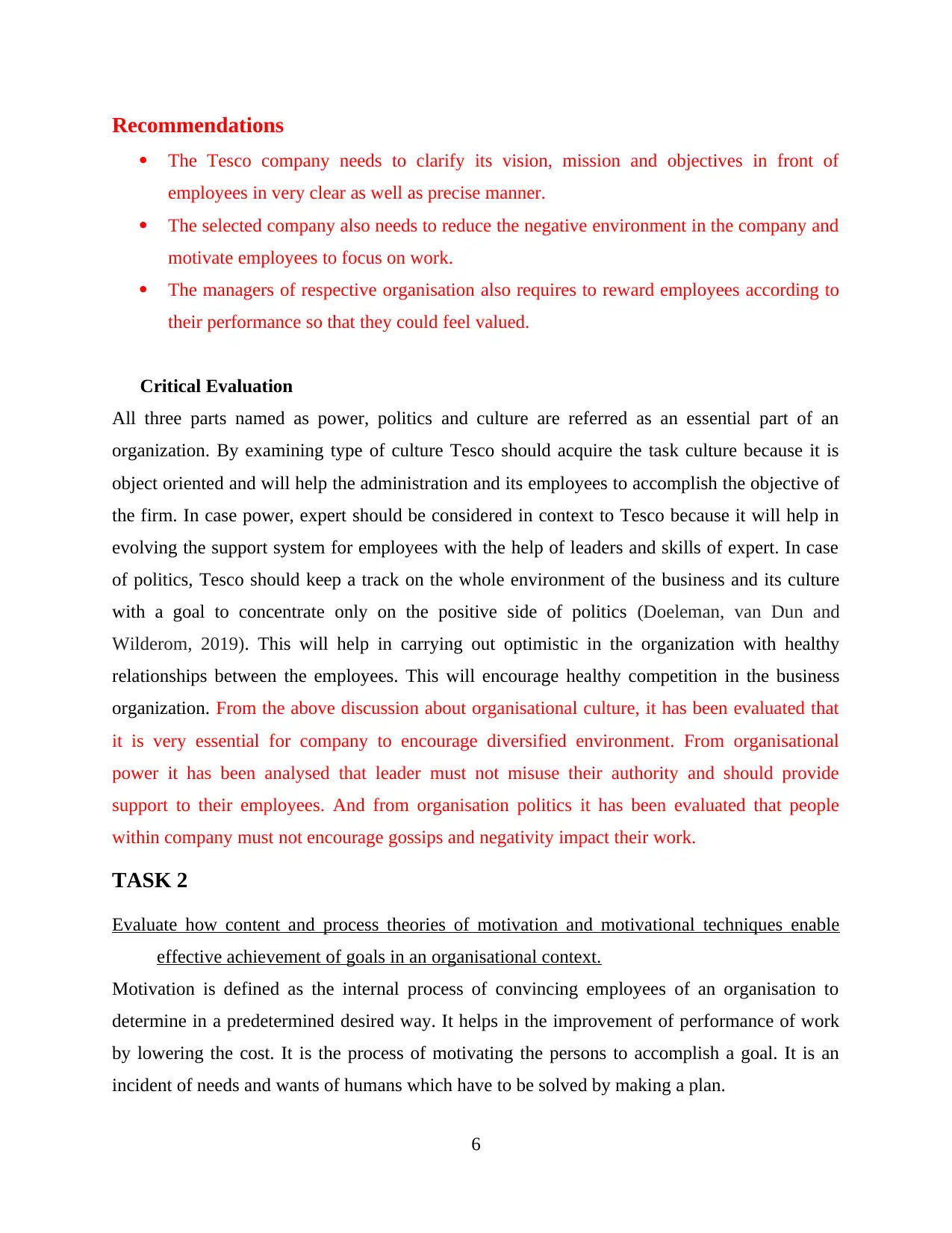
Recommendations
The Tesco company needs to clarify its vision, mission and objectives in front of
employees in very clear as well as precise manner.
The selected company also needs to reduce the negative environment in the company and
motivate employees to focus on work.
The managers of respective organisation also requires to reward employees according to
their performance so that they could feel valued.
Critical Evaluation
All three parts named as power, politics and culture are referred as an essential part of an
organization. By examining type of culture Tesco should acquire the task culture because it is
object oriented and will help the administration and its employees to accomplish the objective of
the firm. In case power, expert should be considered in context to Tesco because it will help in
evolving the support system for employees with the help of leaders and skills of expert. In case
of politics, Tesco should keep a track on the whole environment of the business and its culture
with a goal to concentrate only on the positive side of politics (Doeleman, van Dun and
Wilderom, 2019). This will help in carrying out optimistic in the organization with healthy
relationships between the employees. This will encourage healthy competition in the business
organization. From the above discussion about organisational culture, it has been evaluated that
it is very essential for company to encourage diversified environment. From organisational
power it has been analysed that leader must not misuse their authority and should provide
support to their employees. And from organisation politics it has been evaluated that people
within company must not encourage gossips and negativity impact their work.
TASK 2
Evaluate how content and process theories of motivation and motivational techniques enable
effective achievement of goals in an organisational context.
Motivation is defined as the internal process of convincing employees of an organisation to
determine in a predetermined desired way. It helps in the improvement of performance of work
by lowering the cost. It is the process of motivating the persons to accomplish a goal. It is an
incident of needs and wants of humans which have to be solved by making a plan.
6
The Tesco company needs to clarify its vision, mission and objectives in front of
employees in very clear as well as precise manner.
The selected company also needs to reduce the negative environment in the company and
motivate employees to focus on work.
The managers of respective organisation also requires to reward employees according to
their performance so that they could feel valued.
Critical Evaluation
All three parts named as power, politics and culture are referred as an essential part of an
organization. By examining type of culture Tesco should acquire the task culture because it is
object oriented and will help the administration and its employees to accomplish the objective of
the firm. In case power, expert should be considered in context to Tesco because it will help in
evolving the support system for employees with the help of leaders and skills of expert. In case
of politics, Tesco should keep a track on the whole environment of the business and its culture
with a goal to concentrate only on the positive side of politics (Doeleman, van Dun and
Wilderom, 2019). This will help in carrying out optimistic in the organization with healthy
relationships between the employees. This will encourage healthy competition in the business
organization. From the above discussion about organisational culture, it has been evaluated that
it is very essential for company to encourage diversified environment. From organisational
power it has been analysed that leader must not misuse their authority and should provide
support to their employees. And from organisation politics it has been evaluated that people
within company must not encourage gossips and negativity impact their work.
TASK 2
Evaluate how content and process theories of motivation and motivational techniques enable
effective achievement of goals in an organisational context.
Motivation is defined as the internal process of convincing employees of an organisation to
determine in a predetermined desired way. It helps in the improvement of performance of work
by lowering the cost. It is the process of motivating the persons to accomplish a goal. It is an
incident of needs and wants of humans which have to be solved by making a plan.
6
⊘ This is a preview!⊘
Do you want full access?
Subscribe today to unlock all pages.

Trusted by 1+ million students worldwide
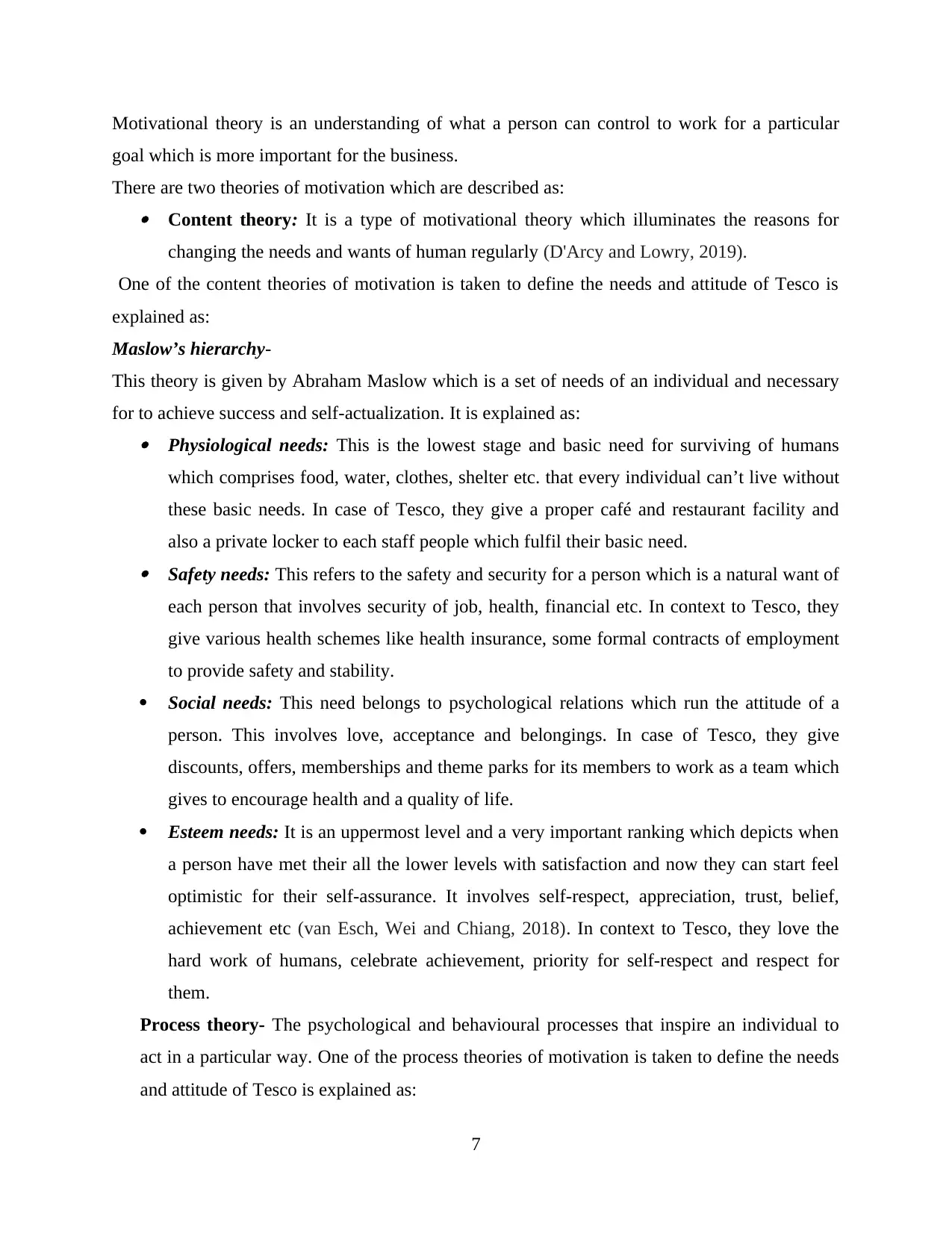
Motivational theory is an understanding of what a person can control to work for a particular
goal which is more important for the business.
There are two theories of motivation which are described as: Content theory: It is a type of motivational theory which illuminates the reasons for
changing the needs and wants of human regularly (D'Arcy and Lowry, 2019).
One of the content theories of motivation is taken to define the needs and attitude of Tesco is
explained as:
Maslow’s hierarchy-
This theory is given by Abraham Maslow which is a set of needs of an individual and necessary
for to achieve success and self-actualization. It is explained as: Physiological needs: This is the lowest stage and basic need for surviving of humans
which comprises food, water, clothes, shelter etc. that every individual can’t live without
these basic needs. In case of Tesco, they give a proper café and restaurant facility and
also a private locker to each staff people which fulfil their basic need. Safety needs: This refers to the safety and security for a person which is a natural want of
each person that involves security of job, health, financial etc. In context to Tesco, they
give various health schemes like health insurance, some formal contracts of employment
to provide safety and stability.
Social needs: This need belongs to psychological relations which run the attitude of a
person. This involves love, acceptance and belongings. In case of Tesco, they give
discounts, offers, memberships and theme parks for its members to work as a team which
gives to encourage health and a quality of life.
Esteem needs: It is an uppermost level and a very important ranking which depicts when
a person have met their all the lower levels with satisfaction and now they can start feel
optimistic for their self-assurance. It involves self-respect, appreciation, trust, belief,
achievement etc (van Esch, Wei and Chiang, 2018). In context to Tesco, they love the
hard work of humans, celebrate achievement, priority for self-respect and respect for
them.
Process theory- The psychological and behavioural processes that inspire an individual to
act in a particular way. One of the process theories of motivation is taken to define the needs
and attitude of Tesco is explained as:
7
goal which is more important for the business.
There are two theories of motivation which are described as: Content theory: It is a type of motivational theory which illuminates the reasons for
changing the needs and wants of human regularly (D'Arcy and Lowry, 2019).
One of the content theories of motivation is taken to define the needs and attitude of Tesco is
explained as:
Maslow’s hierarchy-
This theory is given by Abraham Maslow which is a set of needs of an individual and necessary
for to achieve success and self-actualization. It is explained as: Physiological needs: This is the lowest stage and basic need for surviving of humans
which comprises food, water, clothes, shelter etc. that every individual can’t live without
these basic needs. In case of Tesco, they give a proper café and restaurant facility and
also a private locker to each staff people which fulfil their basic need. Safety needs: This refers to the safety and security for a person which is a natural want of
each person that involves security of job, health, financial etc. In context to Tesco, they
give various health schemes like health insurance, some formal contracts of employment
to provide safety and stability.
Social needs: This need belongs to psychological relations which run the attitude of a
person. This involves love, acceptance and belongings. In case of Tesco, they give
discounts, offers, memberships and theme parks for its members to work as a team which
gives to encourage health and a quality of life.
Esteem needs: It is an uppermost level and a very important ranking which depicts when
a person have met their all the lower levels with satisfaction and now they can start feel
optimistic for their self-assurance. It involves self-respect, appreciation, trust, belief,
achievement etc (van Esch, Wei and Chiang, 2018). In context to Tesco, they love the
hard work of humans, celebrate achievement, priority for self-respect and respect for
them.
Process theory- The psychological and behavioural processes that inspire an individual to
act in a particular way. One of the process theories of motivation is taken to define the needs
and attitude of Tesco is explained as:
7
Paraphrase This Document
Need a fresh take? Get an instant paraphrase of this document with our AI Paraphraser
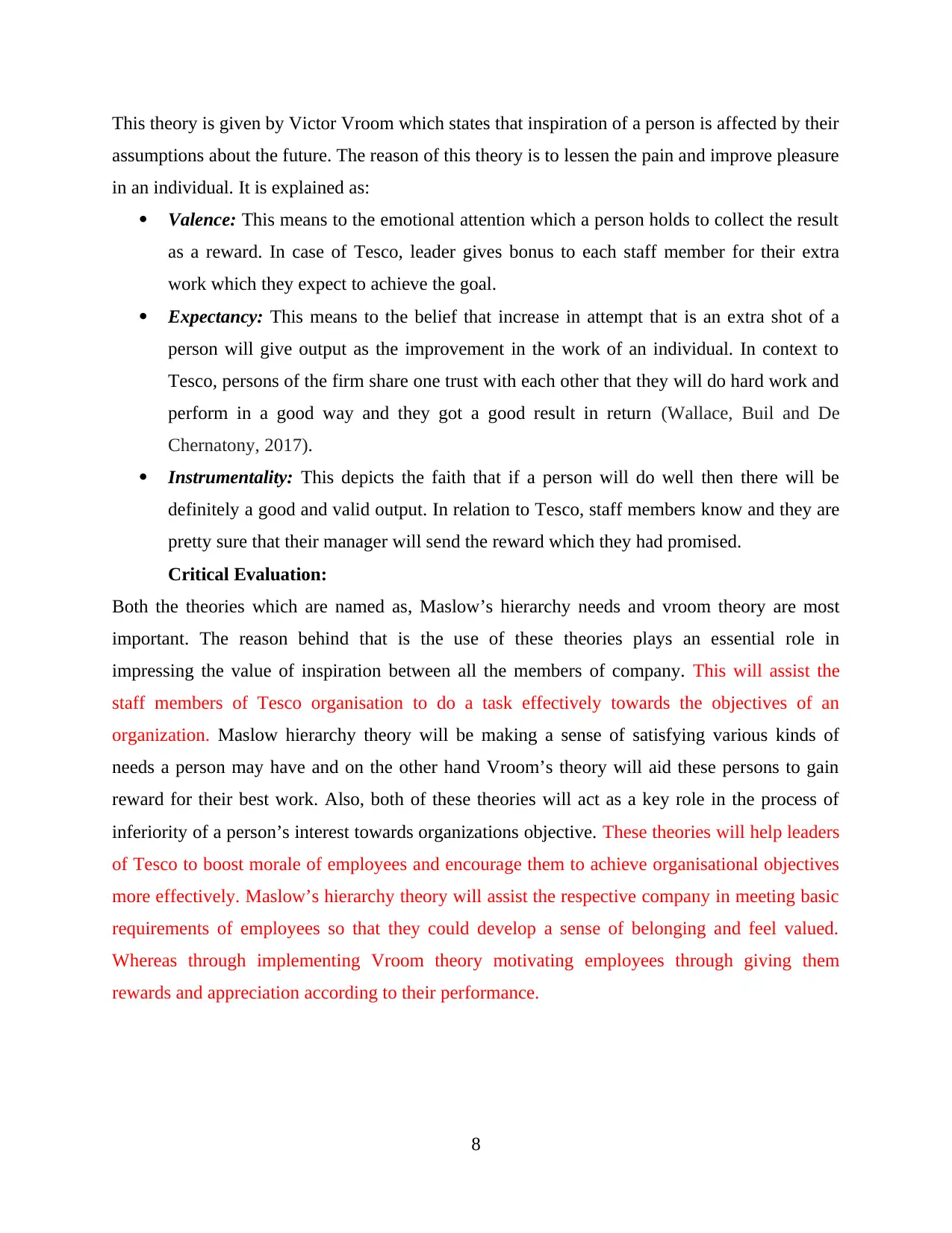
This theory is given by Victor Vroom which states that inspiration of a person is affected by their
assumptions about the future. The reason of this theory is to lessen the pain and improve pleasure
in an individual. It is explained as:
Valence: This means to the emotional attention which a person holds to collect the result
as a reward. In case of Tesco, leader gives bonus to each staff member for their extra
work which they expect to achieve the goal.
Expectancy: This means to the belief that increase in attempt that is an extra shot of a
person will give output as the improvement in the work of an individual. In context to
Tesco, persons of the firm share one trust with each other that they will do hard work and
perform in a good way and they got a good result in return (Wallace, Buil and De
Chernatony, 2017).
Instrumentality: This depicts the faith that if a person will do well then there will be
definitely a good and valid output. In relation to Tesco, staff members know and they are
pretty sure that their manager will send the reward which they had promised.
Critical Evaluation:
Both the theories which are named as, Maslow’s hierarchy needs and vroom theory are most
important. The reason behind that is the use of these theories plays an essential role in
impressing the value of inspiration between all the members of company. This will assist the
staff members of Tesco organisation to do a task effectively towards the objectives of an
organization. Maslow hierarchy theory will be making a sense of satisfying various kinds of
needs a person may have and on the other hand Vroom’s theory will aid these persons to gain
reward for their best work. Also, both of these theories will act as a key role in the process of
inferiority of a person’s interest towards organizations objective. These theories will help leaders
of Tesco to boost morale of employees and encourage them to achieve organisational objectives
more effectively. Maslow’s hierarchy theory will assist the respective company in meeting basic
requirements of employees so that they could develop a sense of belonging and feel valued.
Whereas through implementing Vroom theory motivating employees through giving them
rewards and appreciation according to their performance.
8
assumptions about the future. The reason of this theory is to lessen the pain and improve pleasure
in an individual. It is explained as:
Valence: This means to the emotional attention which a person holds to collect the result
as a reward. In case of Tesco, leader gives bonus to each staff member for their extra
work which they expect to achieve the goal.
Expectancy: This means to the belief that increase in attempt that is an extra shot of a
person will give output as the improvement in the work of an individual. In context to
Tesco, persons of the firm share one trust with each other that they will do hard work and
perform in a good way and they got a good result in return (Wallace, Buil and De
Chernatony, 2017).
Instrumentality: This depicts the faith that if a person will do well then there will be
definitely a good and valid output. In relation to Tesco, staff members know and they are
pretty sure that their manager will send the reward which they had promised.
Critical Evaluation:
Both the theories which are named as, Maslow’s hierarchy needs and vroom theory are most
important. The reason behind that is the use of these theories plays an essential role in
impressing the value of inspiration between all the members of company. This will assist the
staff members of Tesco organisation to do a task effectively towards the objectives of an
organization. Maslow hierarchy theory will be making a sense of satisfying various kinds of
needs a person may have and on the other hand Vroom’s theory will aid these persons to gain
reward for their best work. Also, both of these theories will act as a key role in the process of
inferiority of a person’s interest towards organizations objective. These theories will help leaders
of Tesco to boost morale of employees and encourage them to achieve organisational objectives
more effectively. Maslow’s hierarchy theory will assist the respective company in meeting basic
requirements of employees so that they could develop a sense of belonging and feel valued.
Whereas through implementing Vroom theory motivating employees through giving them
rewards and appreciation according to their performance.
8
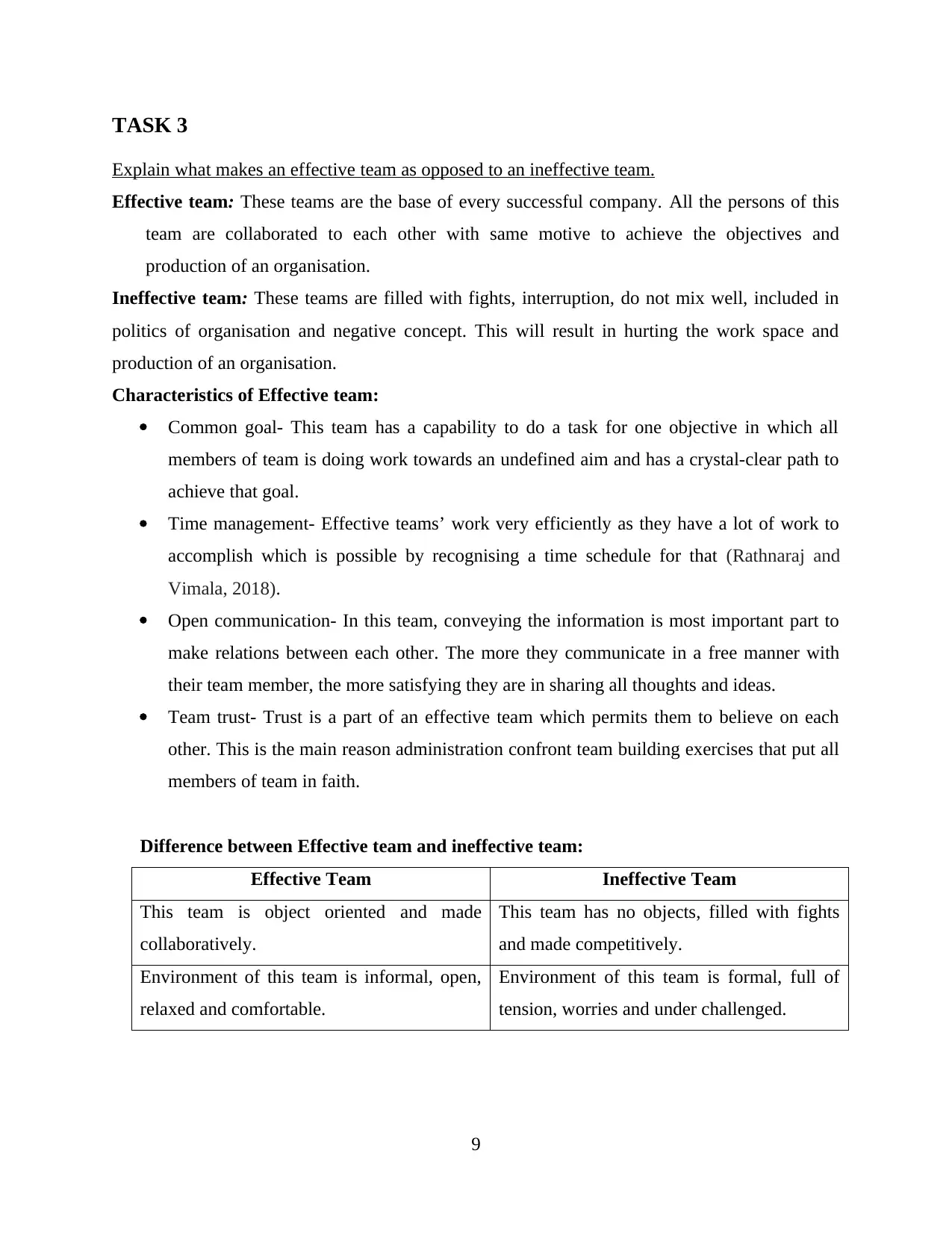
TASK 3
Explain what makes an effective team as opposed to an ineffective team.
Effective team: These teams are the base of every successful company. All the persons of this
team are collaborated to each other with same motive to achieve the objectives and
production of an organisation.
Ineffective team: These teams are filled with fights, interruption, do not mix well, included in
politics of organisation and negative concept. This will result in hurting the work space and
production of an organisation.
Characteristics of Effective team:
Common goal- This team has a capability to do a task for one objective in which all
members of team is doing work towards an undefined aim and has a crystal-clear path to
achieve that goal.
Time management- Effective teams’ work very efficiently as they have a lot of work to
accomplish which is possible by recognising a time schedule for that (Rathnaraj and
Vimala, 2018).
Open communication- In this team, conveying the information is most important part to
make relations between each other. The more they communicate in a free manner with
their team member, the more satisfying they are in sharing all thoughts and ideas.
Team trust- Trust is a part of an effective team which permits them to believe on each
other. This is the main reason administration confront team building exercises that put all
members of team in faith.
Difference between Effective team and ineffective team:
Effective Team Ineffective Team
This team is object oriented and made
collaboratively.
This team has no objects, filled with fights
and made competitively.
Environment of this team is informal, open,
relaxed and comfortable.
Environment of this team is formal, full of
tension, worries and under challenged.
9
Explain what makes an effective team as opposed to an ineffective team.
Effective team: These teams are the base of every successful company. All the persons of this
team are collaborated to each other with same motive to achieve the objectives and
production of an organisation.
Ineffective team: These teams are filled with fights, interruption, do not mix well, included in
politics of organisation and negative concept. This will result in hurting the work space and
production of an organisation.
Characteristics of Effective team:
Common goal- This team has a capability to do a task for one objective in which all
members of team is doing work towards an undefined aim and has a crystal-clear path to
achieve that goal.
Time management- Effective teams’ work very efficiently as they have a lot of work to
accomplish which is possible by recognising a time schedule for that (Rathnaraj and
Vimala, 2018).
Open communication- In this team, conveying the information is most important part to
make relations between each other. The more they communicate in a free manner with
their team member, the more satisfying they are in sharing all thoughts and ideas.
Team trust- Trust is a part of an effective team which permits them to believe on each
other. This is the main reason administration confront team building exercises that put all
members of team in faith.
Difference between Effective team and ineffective team:
Effective Team Ineffective Team
This team is object oriented and made
collaboratively.
This team has no objects, filled with fights
and made competitively.
Environment of this team is informal, open,
relaxed and comfortable.
Environment of this team is formal, full of
tension, worries and under challenged.
9
⊘ This is a preview!⊘
Do you want full access?
Subscribe today to unlock all pages.

Trusted by 1+ million students worldwide
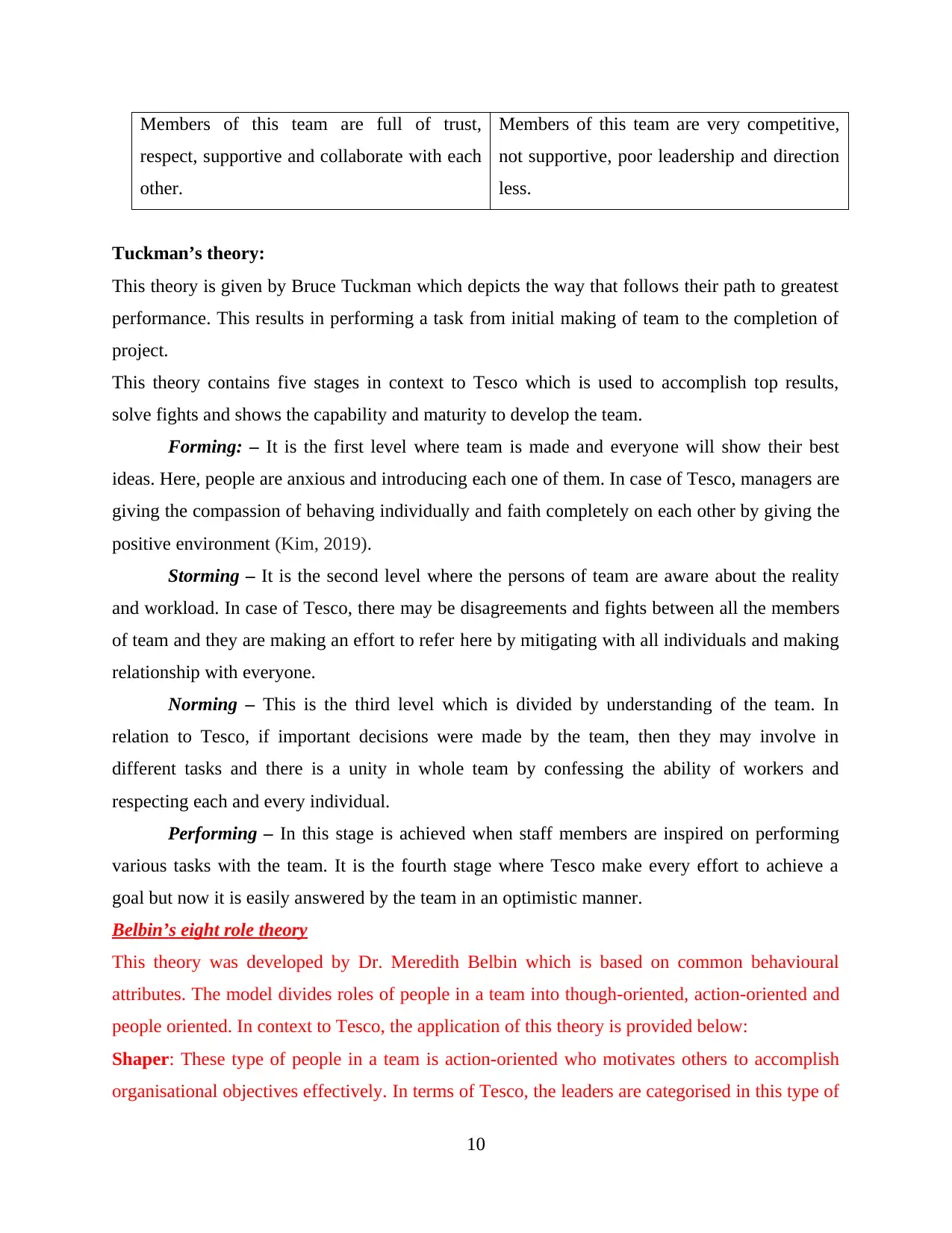
Members of this team are full of trust,
respect, supportive and collaborate with each
other.
Members of this team are very competitive,
not supportive, poor leadership and direction
less.
Tuckman’s theory:
This theory is given by Bruce Tuckman which depicts the way that follows their path to greatest
performance. This results in performing a task from initial making of team to the completion of
project.
This theory contains five stages in context to Tesco which is used to accomplish top results,
solve fights and shows the capability and maturity to develop the team.
Forming: – It is the first level where team is made and everyone will show their best
ideas. Here, people are anxious and introducing each one of them. In case of Tesco, managers are
giving the compassion of behaving individually and faith completely on each other by giving the
positive environment (Kim, 2019).
Storming – It is the second level where the persons of team are aware about the reality
and workload. In case of Tesco, there may be disagreements and fights between all the members
of team and they are making an effort to refer here by mitigating with all individuals and making
relationship with everyone.
Norming – This is the third level which is divided by understanding of the team. In
relation to Tesco, if important decisions were made by the team, then they may involve in
different tasks and there is a unity in whole team by confessing the ability of workers and
respecting each and every individual.
Performing – In this stage is achieved when staff members are inspired on performing
various tasks with the team. It is the fourth stage where Tesco make every effort to achieve a
goal but now it is easily answered by the team in an optimistic manner.
Belbin’s eight role theory
This theory was developed by Dr. Meredith Belbin which is based on common behavioural
attributes. The model divides roles of people in a team into though-oriented, action-oriented and
people oriented. In context to Tesco, the application of this theory is provided below:
Shaper: These type of people in a team is action-oriented who motivates others to accomplish
organisational objectives effectively. In terms of Tesco, the leaders are categorised in this type of
10
respect, supportive and collaborate with each
other.
Members of this team are very competitive,
not supportive, poor leadership and direction
less.
Tuckman’s theory:
This theory is given by Bruce Tuckman which depicts the way that follows their path to greatest
performance. This results in performing a task from initial making of team to the completion of
project.
This theory contains five stages in context to Tesco which is used to accomplish top results,
solve fights and shows the capability and maturity to develop the team.
Forming: – It is the first level where team is made and everyone will show their best
ideas. Here, people are anxious and introducing each one of them. In case of Tesco, managers are
giving the compassion of behaving individually and faith completely on each other by giving the
positive environment (Kim, 2019).
Storming – It is the second level where the persons of team are aware about the reality
and workload. In case of Tesco, there may be disagreements and fights between all the members
of team and they are making an effort to refer here by mitigating with all individuals and making
relationship with everyone.
Norming – This is the third level which is divided by understanding of the team. In
relation to Tesco, if important decisions were made by the team, then they may involve in
different tasks and there is a unity in whole team by confessing the ability of workers and
respecting each and every individual.
Performing – In this stage is achieved when staff members are inspired on performing
various tasks with the team. It is the fourth stage where Tesco make every effort to achieve a
goal but now it is easily answered by the team in an optimistic manner.
Belbin’s eight role theory
This theory was developed by Dr. Meredith Belbin which is based on common behavioural
attributes. The model divides roles of people in a team into though-oriented, action-oriented and
people oriented. In context to Tesco, the application of this theory is provided below:
Shaper: These type of people in a team is action-oriented who motivates others to accomplish
organisational objectives effectively. In terms of Tesco, the leaders are categorised in this type of
10
Paraphrase This Document
Need a fresh take? Get an instant paraphrase of this document with our AI Paraphraser
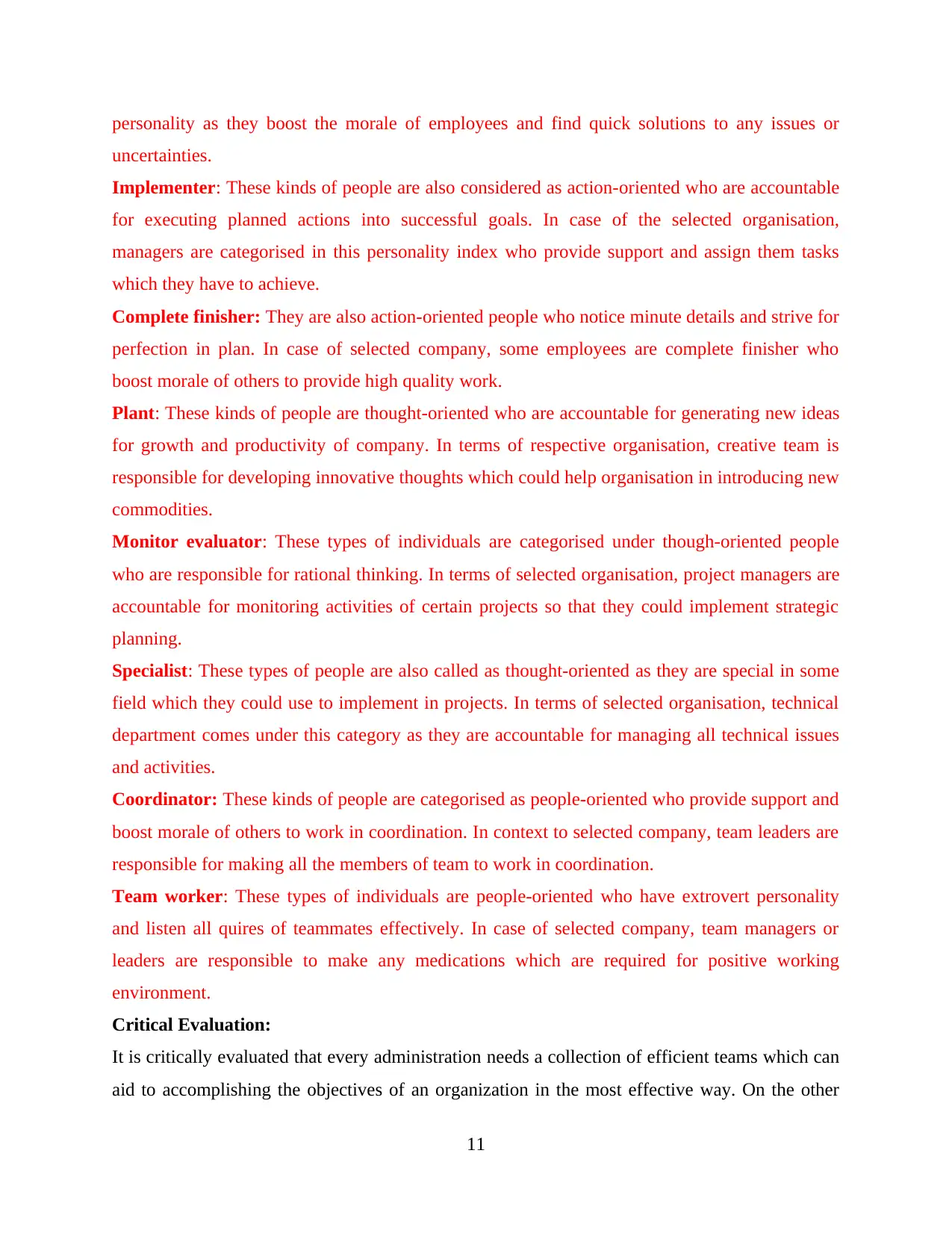
personality as they boost the morale of employees and find quick solutions to any issues or
uncertainties.
Implementer: These kinds of people are also considered as action-oriented who are accountable
for executing planned actions into successful goals. In case of the selected organisation,
managers are categorised in this personality index who provide support and assign them tasks
which they have to achieve.
Complete finisher: They are also action-oriented people who notice minute details and strive for
perfection in plan. In case of selected company, some employees are complete finisher who
boost morale of others to provide high quality work.
Plant: These kinds of people are thought-oriented who are accountable for generating new ideas
for growth and productivity of company. In terms of respective organisation, creative team is
responsible for developing innovative thoughts which could help organisation in introducing new
commodities.
Monitor evaluator: These types of individuals are categorised under though-oriented people
who are responsible for rational thinking. In terms of selected organisation, project managers are
accountable for monitoring activities of certain projects so that they could implement strategic
planning.
Specialist: These types of people are also called as thought-oriented as they are special in some
field which they could use to implement in projects. In terms of selected organisation, technical
department comes under this category as they are accountable for managing all technical issues
and activities.
Coordinator: These kinds of people are categorised as people-oriented who provide support and
boost morale of others to work in coordination. In context to selected company, team leaders are
responsible for making all the members of team to work in coordination.
Team worker: These types of individuals are people-oriented who have extrovert personality
and listen all quires of teammates effectively. In case of selected company, team managers or
leaders are responsible to make any medications which are required for positive working
environment.
Critical Evaluation:
It is critically evaluated that every administration needs a collection of efficient teams which can
aid to accomplishing the objectives of an organization in the most effective way. On the other
11
uncertainties.
Implementer: These kinds of people are also considered as action-oriented who are accountable
for executing planned actions into successful goals. In case of the selected organisation,
managers are categorised in this personality index who provide support and assign them tasks
which they have to achieve.
Complete finisher: They are also action-oriented people who notice minute details and strive for
perfection in plan. In case of selected company, some employees are complete finisher who
boost morale of others to provide high quality work.
Plant: These kinds of people are thought-oriented who are accountable for generating new ideas
for growth and productivity of company. In terms of respective organisation, creative team is
responsible for developing innovative thoughts which could help organisation in introducing new
commodities.
Monitor evaluator: These types of individuals are categorised under though-oriented people
who are responsible for rational thinking. In terms of selected organisation, project managers are
accountable for monitoring activities of certain projects so that they could implement strategic
planning.
Specialist: These types of people are also called as thought-oriented as they are special in some
field which they could use to implement in projects. In terms of selected organisation, technical
department comes under this category as they are accountable for managing all technical issues
and activities.
Coordinator: These kinds of people are categorised as people-oriented who provide support and
boost morale of others to work in coordination. In context to selected company, team leaders are
responsible for making all the members of team to work in coordination.
Team worker: These types of individuals are people-oriented who have extrovert personality
and listen all quires of teammates effectively. In case of selected company, team managers or
leaders are responsible to make any medications which are required for positive working
environment.
Critical Evaluation:
It is critically evaluated that every administration needs a collection of efficient teams which can
aid to accomplishing the objectives of an organization in the most effective way. On the other
11
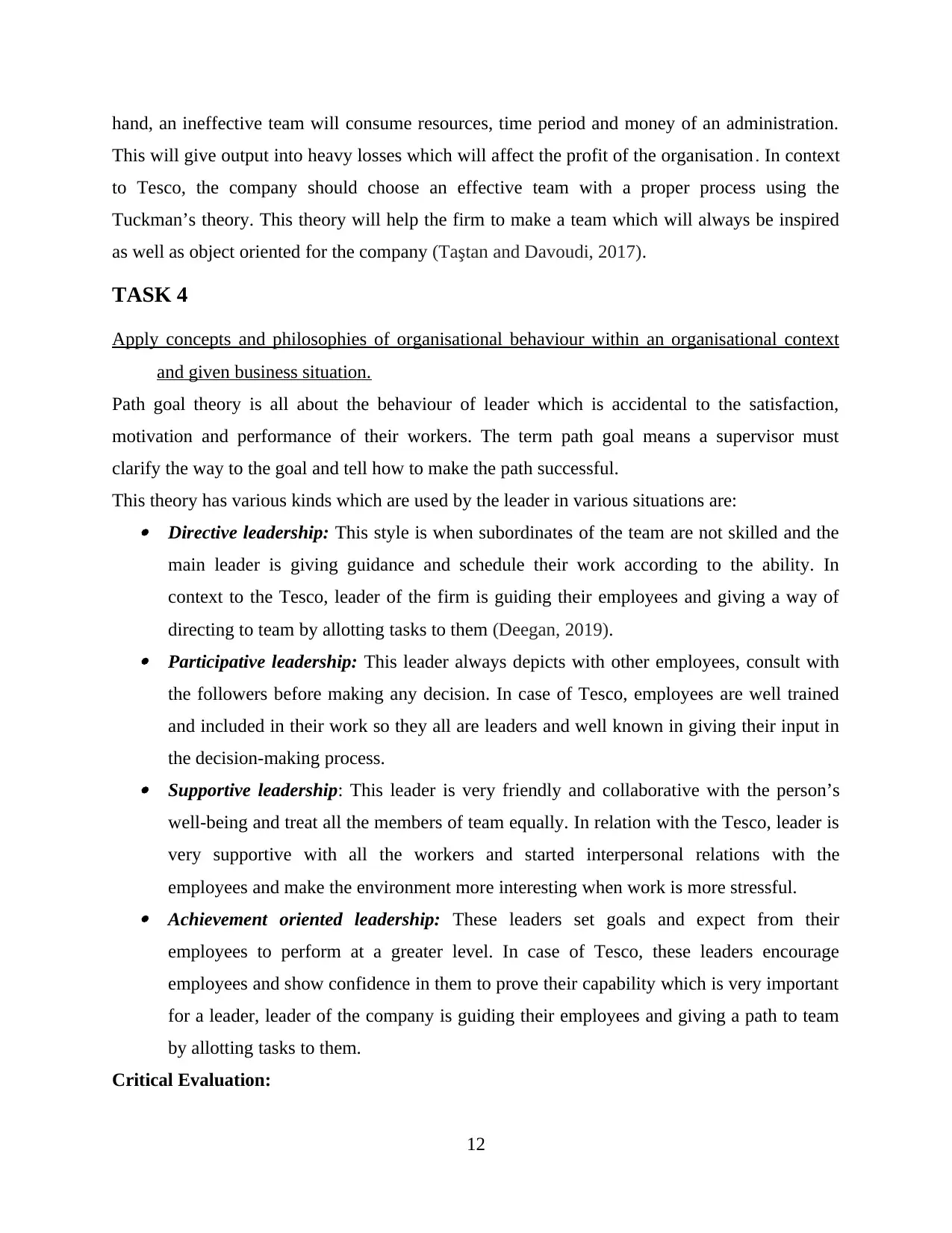
hand, an ineffective team will consume resources, time period and money of an administration.
This will give output into heavy losses which will affect the profit of the organisation. In context
to Tesco, the company should choose an effective team with a proper process using the
Tuckman’s theory. This theory will help the firm to make a team which will always be inspired
as well as object oriented for the company (Taştan and Davoudi, 2017).
TASK 4
Apply concepts and philosophies of organisational behaviour within an organisational context
and given business situation.
Path goal theory is all about the behaviour of leader which is accidental to the satisfaction,
motivation and performance of their workers. The term path goal means a supervisor must
clarify the way to the goal and tell how to make the path successful.
This theory has various kinds which are used by the leader in various situations are: Directive leadership: This style is when subordinates of the team are not skilled and the
main leader is giving guidance and schedule their work according to the ability. In
context to the Tesco, leader of the firm is guiding their employees and giving a way of
directing to team by allotting tasks to them (Deegan, 2019). Participative leadership: This leader always depicts with other employees, consult with
the followers before making any decision. In case of Tesco, employees are well trained
and included in their work so they all are leaders and well known in giving their input in
the decision-making process. Supportive leadership: This leader is very friendly and collaborative with the person’s
well-being and treat all the members of team equally. In relation with the Tesco, leader is
very supportive with all the workers and started interpersonal relations with the
employees and make the environment more interesting when work is more stressful. Achievement oriented leadership: These leaders set goals and expect from their
employees to perform at a greater level. In case of Tesco, these leaders encourage
employees and show confidence in them to prove their capability which is very important
for a leader, leader of the company is guiding their employees and giving a path to team
by allotting tasks to them.
Critical Evaluation:
12
This will give output into heavy losses which will affect the profit of the organisation. In context
to Tesco, the company should choose an effective team with a proper process using the
Tuckman’s theory. This theory will help the firm to make a team which will always be inspired
as well as object oriented for the company (Taştan and Davoudi, 2017).
TASK 4
Apply concepts and philosophies of organisational behaviour within an organisational context
and given business situation.
Path goal theory is all about the behaviour of leader which is accidental to the satisfaction,
motivation and performance of their workers. The term path goal means a supervisor must
clarify the way to the goal and tell how to make the path successful.
This theory has various kinds which are used by the leader in various situations are: Directive leadership: This style is when subordinates of the team are not skilled and the
main leader is giving guidance and schedule their work according to the ability. In
context to the Tesco, leader of the firm is guiding their employees and giving a way of
directing to team by allotting tasks to them (Deegan, 2019). Participative leadership: This leader always depicts with other employees, consult with
the followers before making any decision. In case of Tesco, employees are well trained
and included in their work so they all are leaders and well known in giving their input in
the decision-making process. Supportive leadership: This leader is very friendly and collaborative with the person’s
well-being and treat all the members of team equally. In relation with the Tesco, leader is
very supportive with all the workers and started interpersonal relations with the
employees and make the environment more interesting when work is more stressful. Achievement oriented leadership: These leaders set goals and expect from their
employees to perform at a greater level. In case of Tesco, these leaders encourage
employees and show confidence in them to prove their capability which is very important
for a leader, leader of the company is guiding their employees and giving a path to team
by allotting tasks to them.
Critical Evaluation:
12
⊘ This is a preview!⊘
Do you want full access?
Subscribe today to unlock all pages.

Trusted by 1+ million students worldwide
1 out of 14
Related Documents
Your All-in-One AI-Powered Toolkit for Academic Success.
+13062052269
info@desklib.com
Available 24*7 on WhatsApp / Email
![[object Object]](/_next/static/media/star-bottom.7253800d.svg)
Unlock your academic potential
Copyright © 2020–2026 A2Z Services. All Rights Reserved. Developed and managed by ZUCOL.


